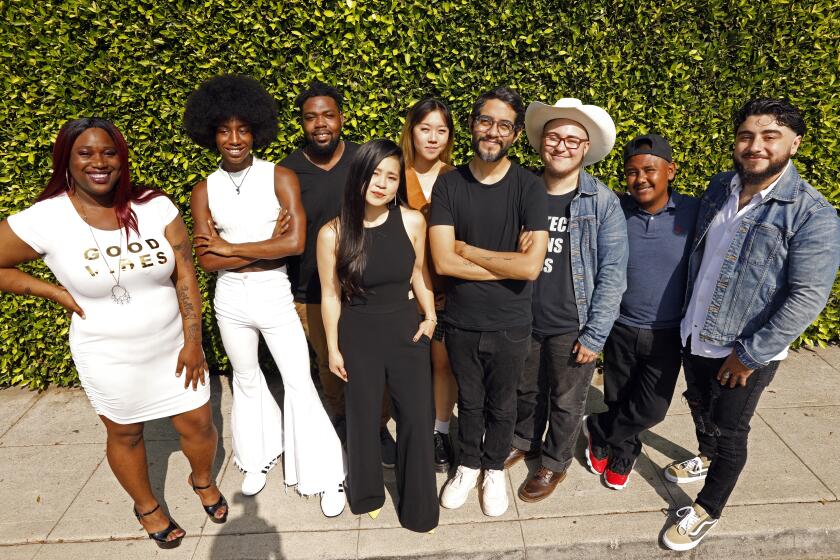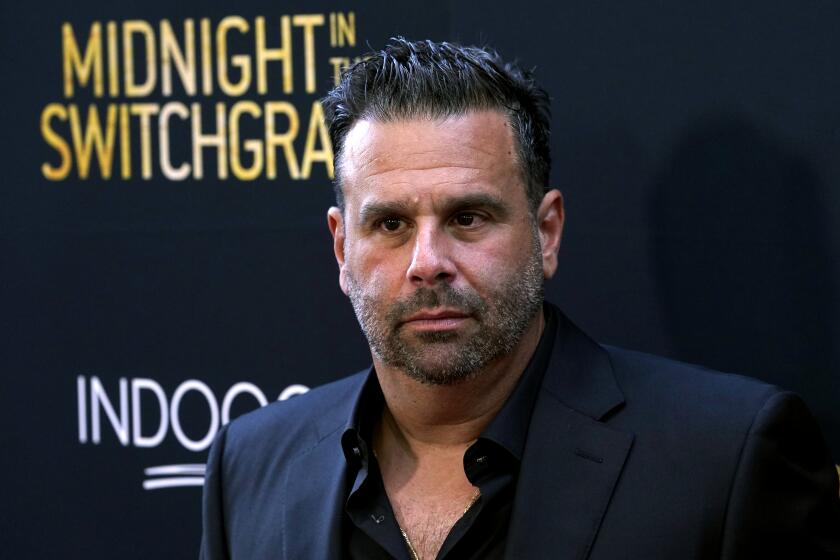It’s ‘Summertime’ and the movie’s too breezy
- Share via
The Times is committed to reviewing theatrical film releases during the COVID-19 pandemic. Because moviegoing carries risks during this time, we remind readers to follow health and safety guidelines as outlined by the Centers for Disease Control and Prevention and local health officials.
More than most musicals, caution tape reading “in the eye of the beholder” should wrap around “Summertime.” Because one man’s mush is another’s ecstasy.
In Carlos López Estrada’s follow-up to his make-rhymes-not-hurt feature directorial debut, “Blindspotting,” spoken-word poets share their personal truths through stories of Los Angeles. The sunny, diverse musical delivers sugary messages of self-affirmation with the shine of a lollipop and the stickiness of a half-eaten sucker. It’s a bold attempt, putting a neo-realist spotlight on a bevvy of first-time and nascent actors, but presented under an obnoxious treacle banner.
No doubt audiences pining to see themselves depicted on screen will fawn over the LGBTQ, Black, Asian and Latinx narratives sprouting from the corners of an L.A. rarely depicted on film. The concept for “Summertime” was born from Estrada’s workshops with a myriad of young artists, and the film expands those efforts, allowing 25 young screenwriting co-authors — each a poet contributing a set of rhymes — a chance to express themselves.
But while representation is imperative, it doesn’t inherently make a compelling story. Movies thrive on conflict. In “Summertime,” the only conflict bubbling under the confessional verses is a brisk 90-minute runtime.
Pinning down a throughline to explain this formless glee-club-adjacent story isn’t easy, but in brief: a band of disparate young adults, from varying neighborhoods and backgrounds, assert their existence in the City of Angels. None of the stakes are big. Rather they’re as modest as the Black LGTBQ elite Yelp reviewer Tyris (Tyris Winter) searching for a hamburger joint, in the process exposing the effects of gentrification, or Madyson (Madyson Park) sharing her favorite music with her Korean relatives in their family-owned restaurant.
Estrada and cinematographer John Schmidt’s ever-curious camera jumps from character to character like pollen on the wind. We’ll follow one misunderstood city dweller, only for the lens to catch sight of another and switch to their unique perspective. The structure allows Estrada to excavate the assorted sights and sounds of Los Angeles: a montage of murals depicting religious iconography and pop culture titans; everyday scenes of parkland soccer games and pier-side fishing; torta trucks and street-food venders shot with equal nostalgia.
In one standout scene, a group of Latinx women adorned in vibrant red dresses circle the silver car of a catcaller. Their balletic movements burst with the energy of the fed up.
Other scenes swoon with equal amazement: two Black women, Bene’t Benton and Amaya Blankenship, combine for a heartfelt remembrance of home on their song “Home Is…”; Gordon Ip, an aggrieved fast food worker at Smiley’s Burger Shack, stands up against abusive microaggressive customers; and the street vendor Raul (Raul Herrera), later appearing as a limo driver, contributes the film’s marquee track: “Clouds,” a stunner of a song concerning big dreams, and even bigger disappointments.
Some comedic bits work too, including the ascent of two struggling street rappers — Anewbyss (Bryce Banks) and Rah (Austin Antoine) — to local superstars; a couple’s therapist with a self-help book titled “How to ‘Rap’ Battle Your Demons”; and a young graffiti tagger, Jason (Jason Alvarez), who perpetually shows up at the wrong time.
The tapestry of Los Angeles depicted on screen should welcome reminders to “In the Heights,” another glitzy musical concerning the critical act of being seen. But the winning parts to “Summertime” do not combine to craft a satisfying whole.
While the musical references body positivity, fatphobia, LGBTQIA rights, gentrification and racism, these weighty topics are lyrically discussed in a rhymed-off vacuum. Too often “Summertime” suffers from what I call the “SNL effect” — it spends so much time preaching to the choir, and it’s so assured in its rightness, that the shallow Hallmark card strokes hamper what should be some powerful storytelling.
After “Raya,” Kelly Marie Tran couldn’t help but join director Carlos López Estrada as producer on his “Summertime” movie, made with L.A. poets. Here’s why.
Though oppressed groups should expect the space to assert their rights to happiness, shouldn’t art also be challenging? Shouldn’t our assumptions, correct as they may be, exist uneasily in opposition to their polar opposites? If not, then are we not lapping in the waters of a welcomed yet uneventful utopia?
In “Summertime” there is no harsh winter ready to snuff out the boundless exuberance of its activist-artists. The lack of real stakes, real villains — even the invisible societal kind — threatens to flatten the array of astounding performances. (Including those of Ip, Winters and a gut-wrenching turn from Marquesha Babers.)
If you’re operating on Estrada’s earnest wavelength, then the lyrical virtuosity of this intermittently charming musical may hit every note, even when the first-time actors occasionally struggle to translate the dramatic import of their words. But for others, mere representation will not be enough.
“Summertime” bursts with a heart that’s in the right place, giving on-screen life to Los Angeles’ overlooked milieux and its underseen people. It’s a shame the music skips the uncomfortable beats that are equally worth savoring.
'Summertime'
Rating: R, for language throughout and sexual references
Running time: 1 hour, 35 minutes
Playing: The Landmark, West L.A.
More to Read
Only good movies
Get the Indie Focus newsletter, Mark Olsen's weekly guide to the world of cinema.
You may occasionally receive promotional content from the Los Angeles Times.











